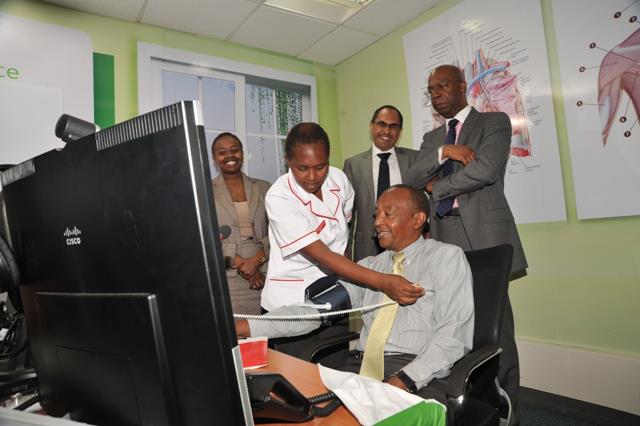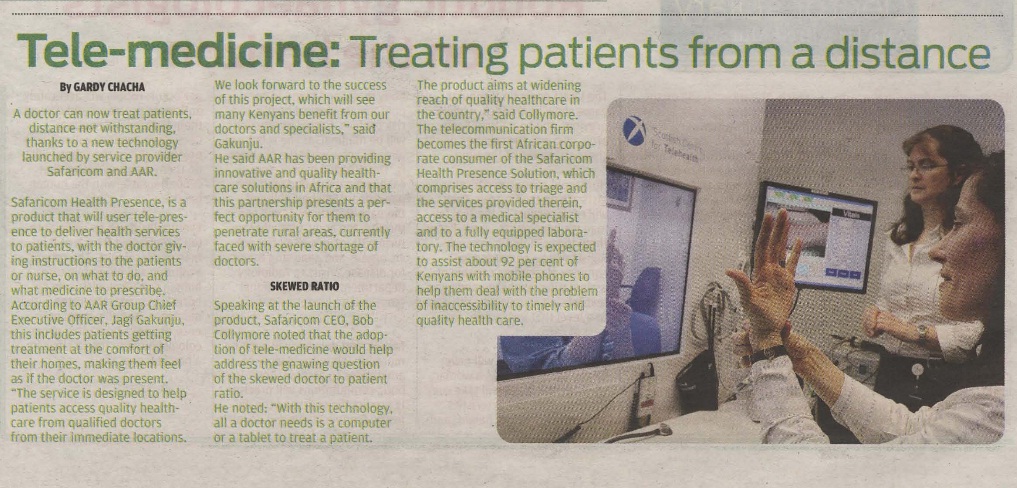“They Copied My Concept”: Ruling in Dedan Maina Warui & another v. Safaricom case
- Victor Nzomo |
- September 23, 2014 |
- CIPIT Insights
“It could be said that Copyright seeks to protect the author’s actual expression and not the ideas, and it does not therefore forbid independent creation. As such, the claim that the two parties in this suit had an idea on tele-healthcare, but which they expressed differently is not untenable in law.” – Gikonyo J. at page 7.
In a recent ruling by the High Court in the case of Dedan Maina Warui & another v Safaricom Limited [2014] eKLR, a medical doctor was denied a temporary injunction and an order of delivery up with respect to a health-related product launched by Safaricom. A copy of the ruling is available here.
Dr. Dedan Maina Warui claims that Safaricom infringed its copyright in a concept styled under the name “Med Dispenser” which the doctor pitched to the leading mobile network operator’s Enterprise Business Unit on or about March 2011. To prove ownership of the copyright in the concept, the doctor presented a certificate of registration No. CR 000712 dated 8th March, 2011 whereby the Med Dispenser was registered as a Literary Work number KCB 0712 by the Kenya Copyright Board. The literary work in question is a concept paper containing the work flow, methodology or the process in which the med dispenser innovation would work once deduced into a software program.

Safaricom admitted that it did give some initial consideration to the Warui’s proposal, but however made a decision to proceed with a separate proposal which involved a partnership with AAR and Cisco Systems Inc. (Cisco’s system is featured in video featured above) to launch the Tele-health product which was developed without any reference to the Warui’s innovation or ideas. Safaricom claims that the electronic medical prescription concept upon which it’s “Health Presence” product is built, has been in use in other jurisdiction, namely India, since May 2010 and was therefore not an original idea of Warui as claimed.
The learned Gikonyo J. appears to have rendered a fair ruling in this case avoiding the error made by his brother Havelock J. in the case of Faulu Kenya Deposit Taking Microfinance Limited v Safaricom Limited [2012]eKLR where the latter stated that a concept paper does not fall within any of the existing categories of copyright works (See our analysis of Havelock and his ruling here).
In October 2011, a media report published here by our good friends over at CIO East Africa announces that Cisco, Deaf Aid and Safaricom formally piloted the first Cisco HealthPresence clinic in Kenya. The article reads in part:
“This first implementation of Cisco’s HealthPresence solution in Kenya demonstrated how technology can transform the delivery of healthcare to underserved, remote, and rural areas. Bandwidth connectivity was provided by Safaricom, the leading provider of converged communication solutions in Kenya.”

In the same month, Warui claims he saw the above article titled: “Tele-medicine: Treating patients from a distance” published by the Standard newspaper on October 23, 2012. The article reads in part:
“Safaricom Health Presence is a product that will use tele-presence to deliver health services to patients, with the doctor giving instructions to the patients or nurse, on what to do, and what medicine to prescribe. (…) Speaking at the launch of the product, Safaricom CEO, Bob Collymore noted that the adoption of tele-medicine would help address the gnawing question of the skewed doctor to patient ratio. He [Collymore] noted: ‘With this technology, all a doctor needs is a computer or a tablet to treat a patient. The product aims at widening reach of quality healthcare in the country’.”
Warui further claims that Safaricom made a business presentation in January 2013 on its “Health Presence Solution” to the Pharmaceutical Society of Kenya. In light of these two claims, Warui alleges that these products by Safaricom were based on his work which formed the core of his proposal registered as a literary work with KECOBO.
While the court rightly agrees with Warui that his concept paper was copyrightable, the ruling is cautious to note that from the evidence adduced by Warui, it is not clear which exclusive rights in the Concept Paper Warui is alleging to have been breached by Safaricom. Therefore the court makes the correct judgment call by stating as follows:-
“…In the absence of oral evidence which can be tested by way of cross examination, it would be difficult to ascertain whether the Defendant [Safaricom] has infringed on any intellectual property rights of the Plaintiff [Warui] in the Med Dispenser innovation by introducing the Safaricom Health Care Presence platform in conjunction with Cisco Limited. From the material before the Court, the Plaintiffs did not quite navigate the mix in this matter arising from the circumstances of the case, and thus, did not establish a prima facie case with a probability of success. The upshot is that the application before the court fails. However, the suit should be set down for hearing on a priority basis so that the substantive issues which are of great significance in the field of intellectual property law are resolved once and for all.”
